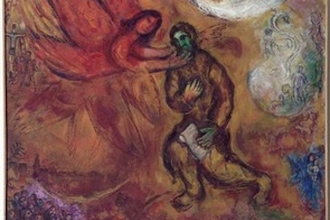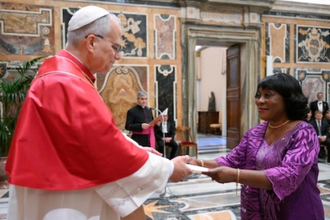Sunday Reflection with Fr Robin Gibbons - 4 November 2018

Francis meets leper
Thirty-first Sunday in Ordinary Time
"The scribe said to him, "Well said, teacher. You are right in saying, 'He is One and there is no other than he.' And 'to love him with all your heart, with all your understanding, with all your strength, and to love your neighbour as yourself' is worth more than all burnt offerings and sacrifices."(Mk 13:32,33)
The dialogue between the Scribe and Jesus in Mark 13, is certainly not a hostile encounter, for implicit in it is the wisdom of the Scribe who understands that Jesus knows what the greatest of all the commandments is, but in his question to him is simply trying to determine what it is! More importantly we need to recognise that Jesus does not answer by giving us one of the actual Ten Commandments, instead he distils the essence of what the commandments mean in terms of the horizon of our encounter with God and each other in the course of our daily lives.
In fact part of Jesus' reply comes from the prayer of the Shema, recited at the Jewish liturgy of Morning and Evening Prayer: "Hear, O Israel: The Lord our God, the Lord is one. Love the Lord your God with all your heart and with all your soul and with all your strength." (Deut 6:4,5) Jesus couples this with a sentence on loving our neighbour found in Leviticus 19, which has extra potency if we include the sentence immediately before it: "You shall not hate your brother (or sister) in your heart, but you shall reason frankly with your neighbour, lest you incur sin because of him. You shall not take vengeance or bear a grudge against the sons (daughters) of your own people, but you shall love your neighbour as yourself: I am the Lord." (Lev 19:17,18). In coupling these two phrases together Jesus has placed a heavy burden on us, because it is going to make extra demands on our understanding of love.
This is perhaps the real cross we are commanded to take up each day in following Jesus, but we need to avoid equating love with any form of enforced activity nor can we attribute any penalty or punishment to ourselves if we find loving others (and even God) difficult. Perhaps that might puzzle some of you, but once we recognise that God does not demand love but invites us to freely respond to a love already God-given, then we can begin to see how the generosity of God, discovered by us in the gift of Jesus and the Holy Spirit, makes sense in terms of relationships not legal contracts!
It's a big leap to step away from the safety of rules and regulations, where we can let doctrine and law be the first and last port of call. No! Jesus takes us well out of our safety zone, places us exactly where he is, in the lives of others, and it is difficult. We cannot love others exactly as we love God, nor are we capable of really loving individuals in exactly the same way, well maybe some amongst you can, but to my own cost I have to admit I can't. It's no use saying that love is an act of will because there are too many other things involved in loving, such as emotion, intellect and all those complex biological responses human beings have!
What Jesus is calling us to do in this greatest of commandments is conversion of our lives, to radical change which shows us that through the new horizon and 'experience' of God and another we can really discover love. That love as St Paul says in 1 Corinthians 13, has many dimensions, but it is only in encounter, entering into the experience that we find our horizons change.
May I share one simple example from the life of a much loved saint, Francis of Assisi. Fr Paul Rout OFM shared the insight that the transformation of Francis into somebody who loved all creation began with meeting lepers, that which he feared most he encountered head on and it transformed him:
"The Lord gave to me, Brother Francis, thus to begin to do penance; for when I was in sin it seemed to me very bitter to see lepers, and the Lord Himself led me amongst them and I showed mercy to them.
And when I left them, that which had seemed to me bitter was changed for me into sweetness of body and soul. And afterwards I remained a little and I left the world." (Testament 1226)
From that meeting Francis began his own journey into the greatest commandment, continually changing his horizons, so that at the end of his life he could write this: "Therefore all those who unjustly inflict upon us tribulations and anguishes, shames and injuries, sorrows and torments, martyrdom and death, are our friends whom we ought to love much, because we gain eternal life by that which they make us suffer." (Rule Chapter 22) That is love !
Lectio Divina
St Clare of Assisi
"We become what we love and who we love shapes what we become. If we love things, we become a thing. If we love nothing, we become nothing. Imitation is not a literal mimicking of Christ, rather it means becoming the image of the beloved, an image disclosed through transformation. This means we are to become vessels of God's compassionate love for others."
St Therese of Lisieux, part of her Little Way
"At the Last Supper Jesus makes it clearer still. He says - oh, so tenderly! - "I have a new commandment to give you, that you are to love one another; that your love for one another is to be like that love I have borne you. The mark by which all men will know you for my disciples will be the love you bear one another."
Well, how did Jesus love his disciples? And why did he love his disciples? You may be quite sure that their natural qualities did nothing to attract him. They were only poor sinners, so ignorant, their thoughts so earthbound; and yet Jesus calls them his friends, his brothers. He wants them to reign with him in his Father's kingdom; he is determined to win them admission, even if it means dying on a cross.
Meditating on these words of Jesus, Mother, I began to see how imperfect my own love was; it was so obvious that I didn't love my sisters as God loves them. I realise, now, that perfect love means putting up with other people's shortcomings, feeling no surprise at their weaknesses, finding encouragement even in the slightest evidence of good qualities in them. But the point which came home to me most of all was that it was no good leaving charity locked up in the depths of your heart. "A lamp," Jesus says, "is not lighted to be put away under a bushel measure; it is put on the lamp-stand, to give light to all the people of the house." The lamp, I suppose, stands for charity; and the cheerful light it gives isn't meant simply for the people we are fond of; it is meant for everybody in the house, without exception."
Fr Robin Gibbons is an Eastern Rite Catholic Chaplain for Melkites in the UK. He is also an Ecumenical Canon of Christ Church Cathedral, Oxford. See: www.indcatholicnews.com/news/35821


















